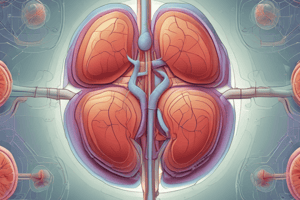Podcast
Questions and Answers
What is the primary role of the proximal tubules in K+ regulation?
What is the primary role of the proximal tubules in K+ regulation?
- Exchanging K+ for Na+
- Determining urinary K+ excretion
- Secreting K+ into the urine
- Reabsorbing nearly all the K+ (correct)
How does aldosterone influence potassium levels?
How does aldosterone influence potassium levels?
- Increases K+ reabsorption in the proximal tubules
- Decreases urinary K+ excretion
- Stimulates K+ secretion in the distal tubules (correct)
- Inhibits K+ secretion
What can happen to excess potassium in individuals with renal failure?
What can happen to excess potassium in individuals with renal failure?
- Converted to sodium
- Excreted at normal levels
- It is completely reabsorbed
- Accumulated to toxic levels (correct)
What is the main determinant of urinary K+ excretion?
What is the main determinant of urinary K+ excretion?
What happens when there is an acute rise in plasma K+ concentration?
What happens when there is an acute rise in plasma K+ concentration?
Flashcards
Kidney's Role in K+ Regulation
Kidney's Role in K+ Regulation
The kidneys play a crucial role in maintaining potassium (K+) balance in the body. They initially reabsorb almost all of the K+ in the proximal tubules. However, under the influence of the hormone aldosterone, additional K+ is secreted into the urine in exchange for sodium (Na+) in the distal tubules and collecting ducts.
Distal Nephron: K+ Excretion
Distal Nephron: K+ Excretion
The distal part of the nephron, including the distal tubules and collecting ducts, plays a primary role in determining how much K+ is excreted in urine.
K+ Excess & Renal Failure
K+ Excess & Renal Failure
Most people consume more potassium than their bodies need. The excess is eliminated through urine, but if the kidneys are not working properly, it can build up to dangerous levels.
Cellular K+ Uptake
Cellular K+ Uptake
Signup and view all the flashcards
Aldosterone's Role in K+ Regulation
Aldosterone's Role in K+ Regulation
Signup and view all the flashcards
Study Notes
Kidney Regulation of Potassium (K+)
- Kidneys play a crucial role in maintaining potassium balance.
- Proximal tubules initially reabsorb nearly all potassium.
- Aldosterone stimulates additional potassium secretion into urine, exchanging it for sodium in distal tubules and collecting ducts.
- Distal nephron is the primary controller of urinary potassium excretion.
- Most people consume more potassium than needed, and excess is excreted in urine.
- Renal failure can cause potassium to accumulate to toxic levels.
- Cellular uptake of potassium from extracellular fluid (ECF) helps normalize acutely elevated plasma potassium levels.
- Excess plasma potassium rapidly moves into cells to regulate plasma levels.
Studying That Suits You
Use AI to generate personalized quizzes and flashcards to suit your learning preferences.



